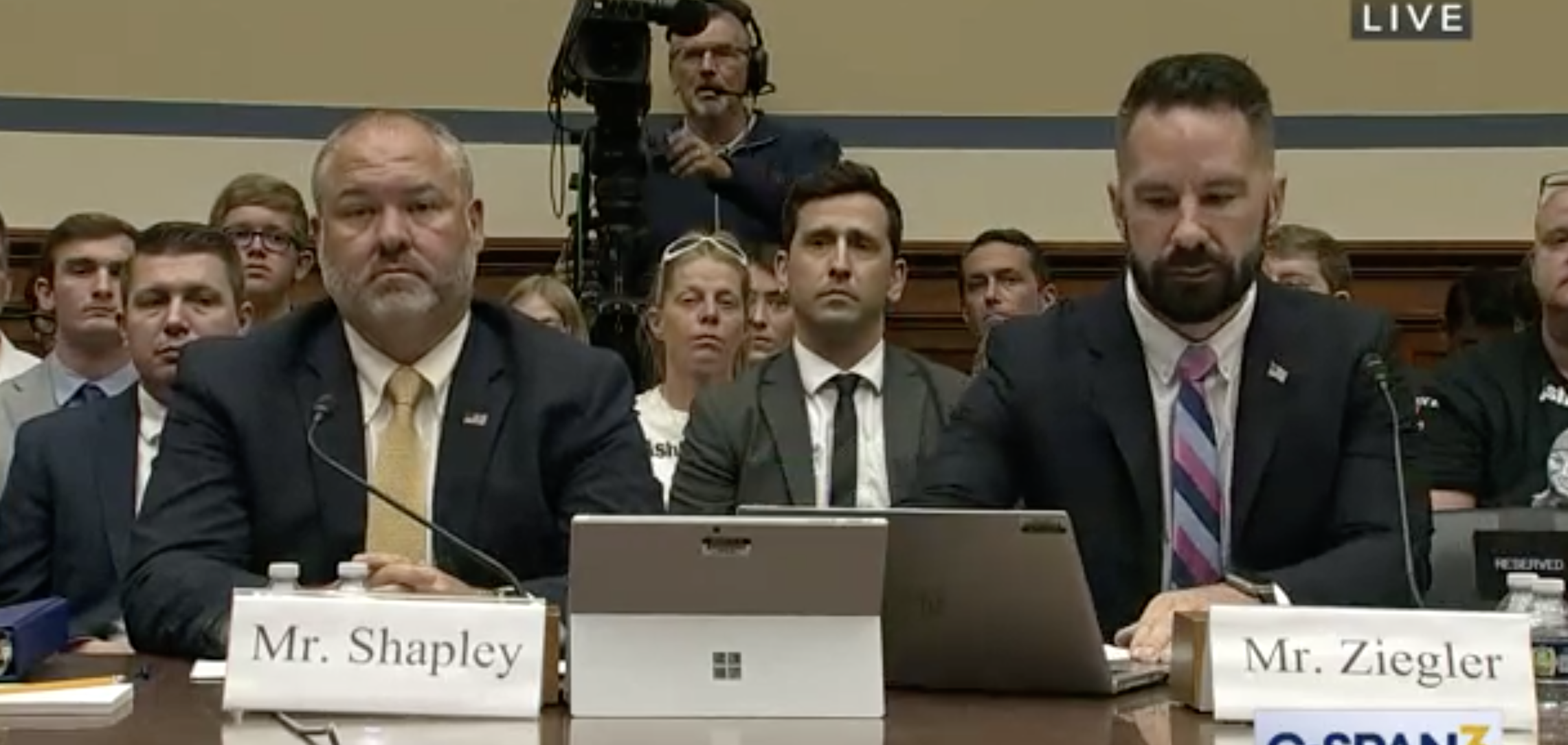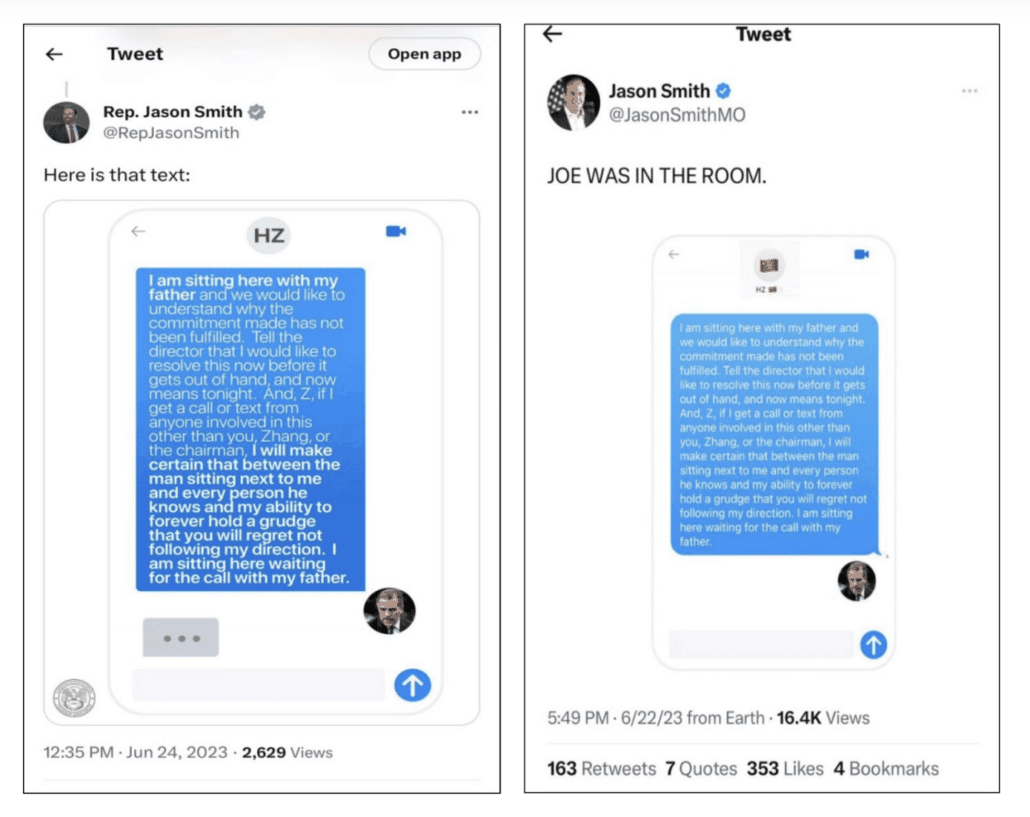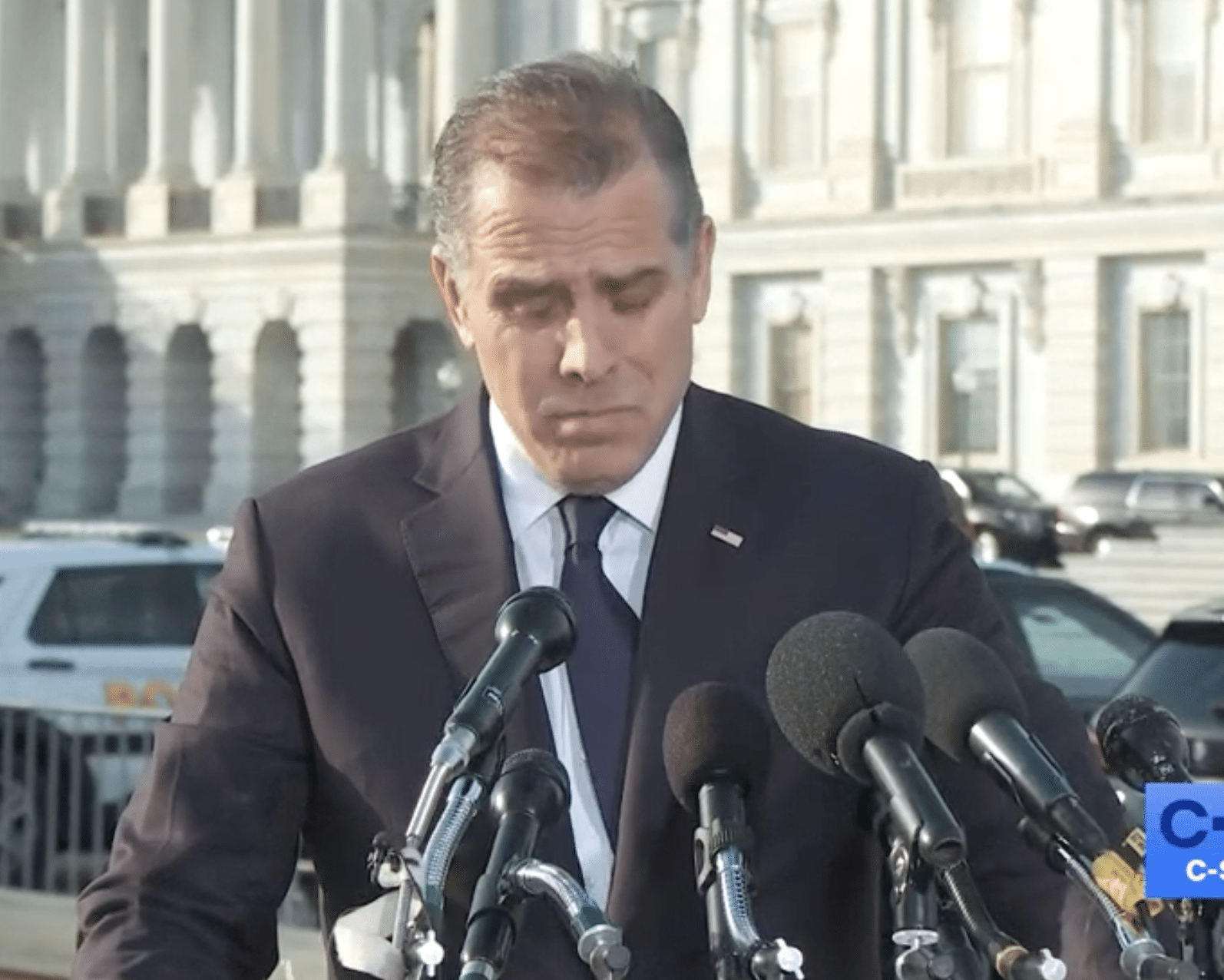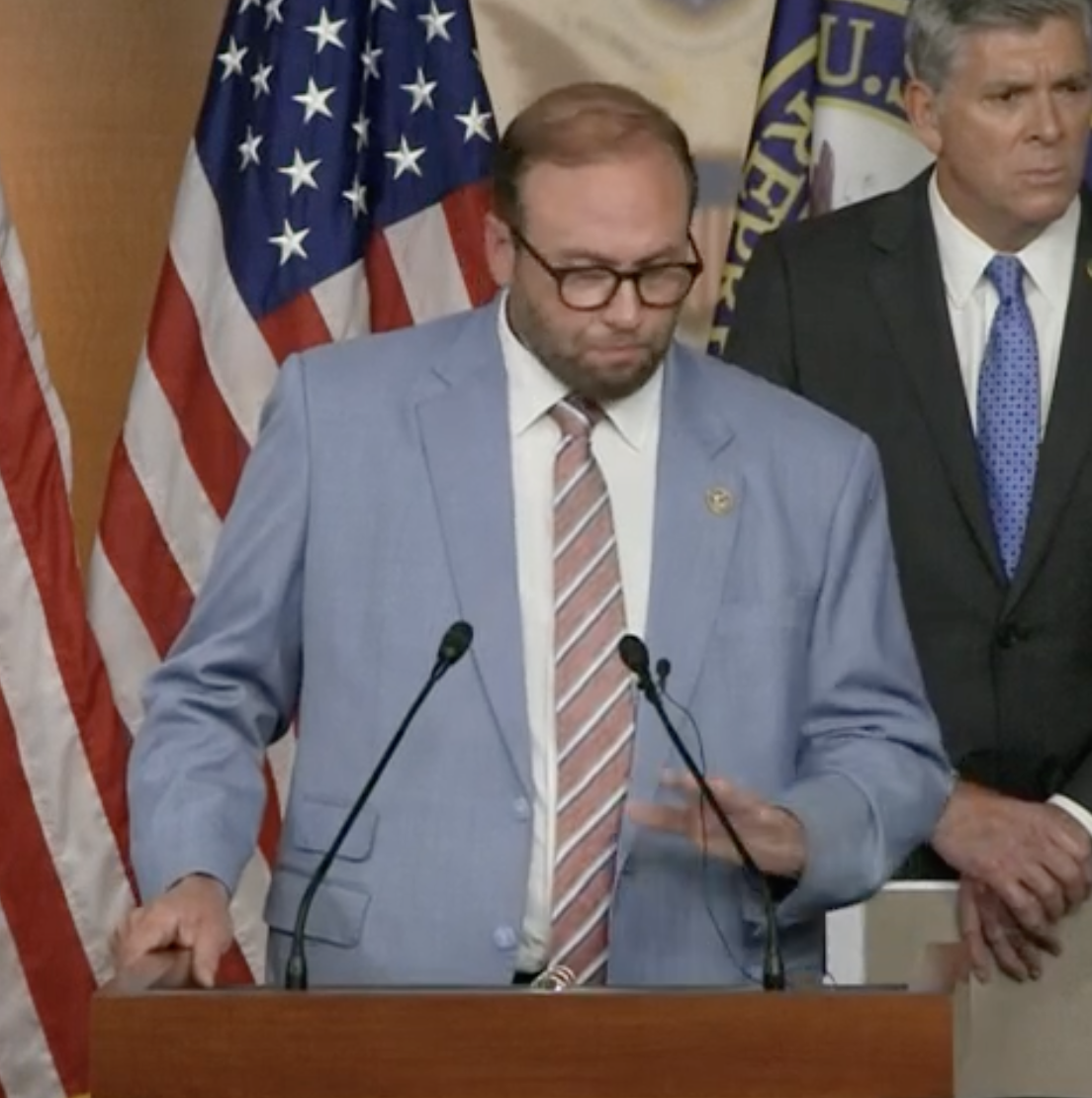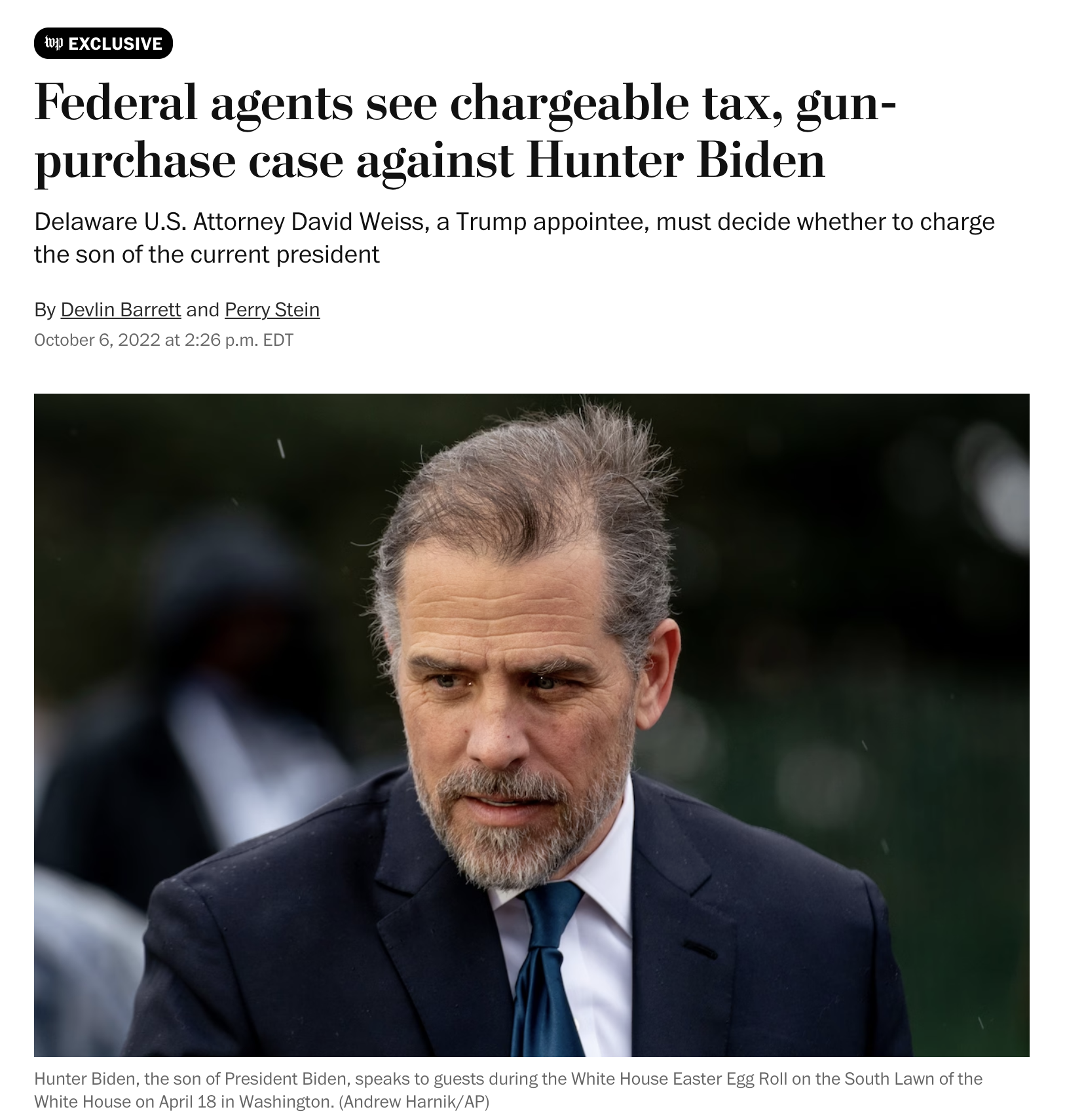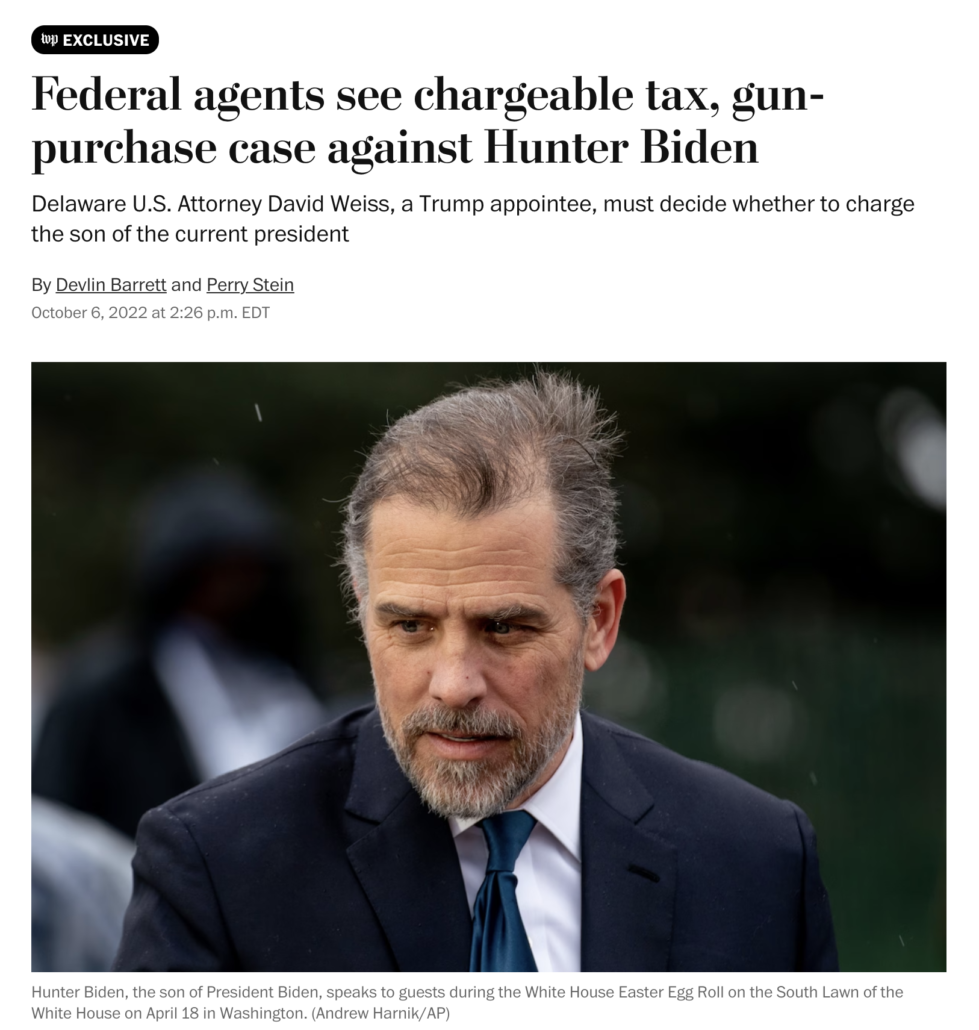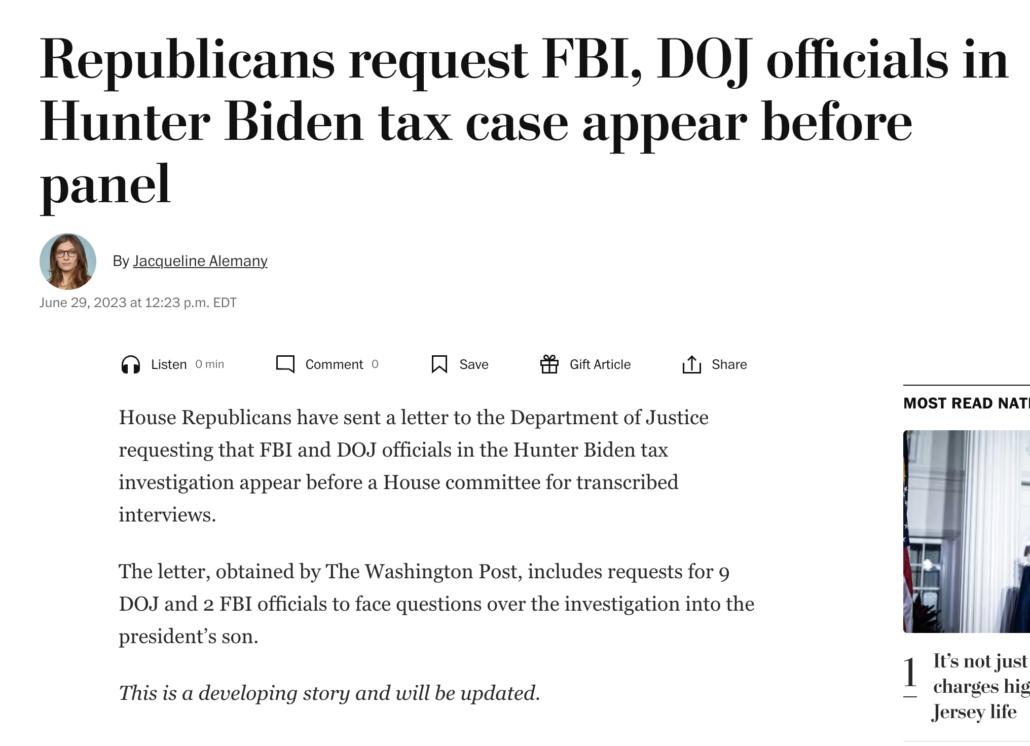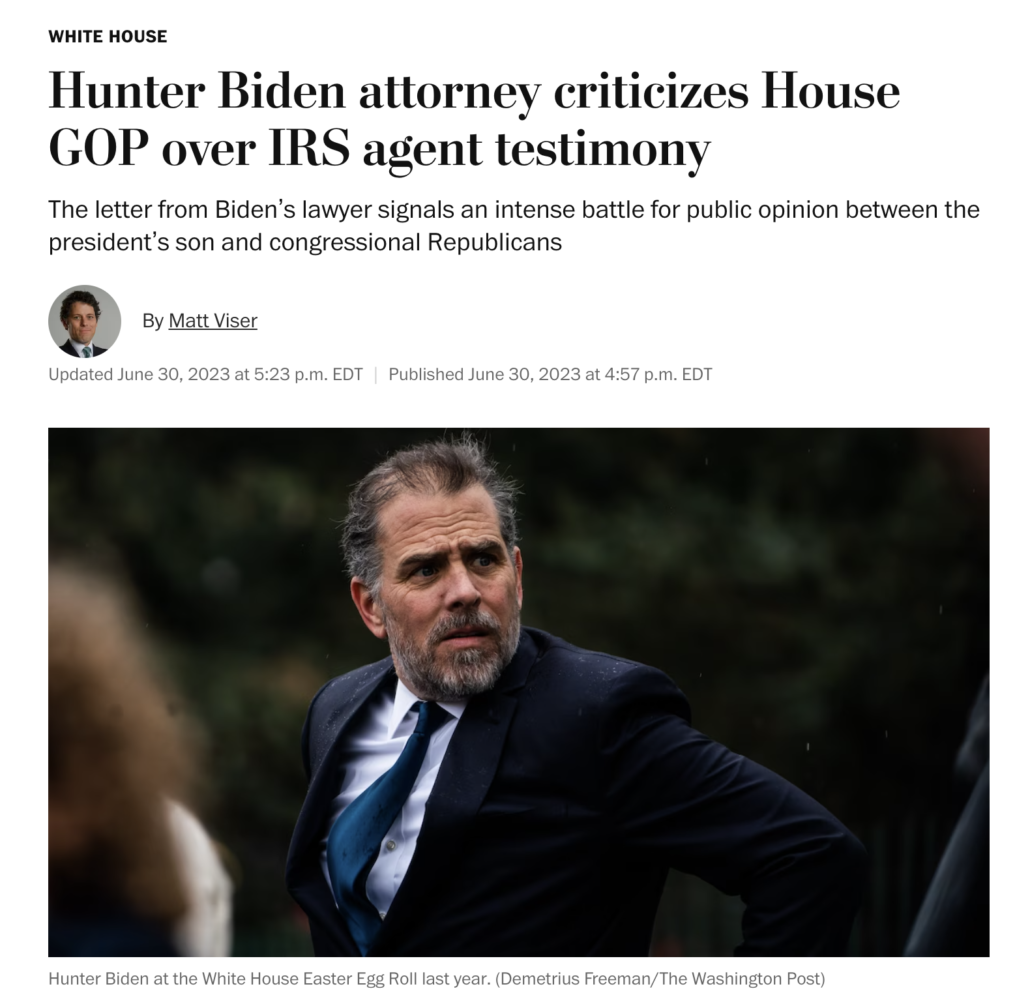As a number of people have noted, the second so-called IRS whistleblower on the Hunter Biden case pointed to the official release of the documents Trump stole as an example of another high profile case where (he claimed, incorrectly), like the Hunter Biden one, there were leaks.
Q What’s an example of another high-profile case that we’re comparing that to?
A So some of the information that was released — or some of the information that was leaked related to the Trump classified documents. So that case. So there were actual pictures that were leaked from inside the search warrant. And this is what my memory of seeing things in the media. So that’s something that I remember. But, I mean — yeah.
It’s a testament to the way he has internalized Trump propaganda. It is one indicator of his unreliability.
There are more.
Far more.
The man should not be treated as credible.
All Whistleblower X’s International Tax Experience Has Been Milking Hunter Biden
Start with his own description of his work experience.
While he has been with the IRS for 13 years, it’s actually not clear how experienced he is in this kind of investigation. As he described, until just before he personally predicated the Hunter Biden investigation in 2018, he was a Public Information Officer, seemingly in both a public-facing role and working investigations.
Literally his first investigation on IRS’ International Tax and Financial Crimes group was into Hunter Biden.
And that’s important because he seems to struggle with due process. Throughout his presentation, for example, he seems to have little understanding of FBI guidelines, including least intrusive means and required approvals for Sensitive Investigative Matters. Many of his complaints amount to a complaint that he wasn’t permitted to violate rules that FBI has re-emphasized in the wake of the Carter Page IG Report.
So in a sense, Republicans are wailing because FBI wouldn’t violate rules the FBI didn’t even violate with Carter Page, such as doing physical surveillance of a candidate’s son 14 days before the election.
Q Why did you have to get approval for that?
A Because we were in a posture at that point that we couldn’t do anything that appeared — any investigative activities pretty much whatsoever.
Q But you weren’t wearing an IRS windbreaker, and you weren’t driving a car marked with IRS letters on it. So how would anyone possibly know? It’s a free country. You’re allowed to drive by any house you want.
A Yeah, I didn’t want it — because I think at that time we were trying to do surveillance of pretty much everyone we were going to potentially interview. So he was just another one of the people that we wanted to do that for. I guess I don’t know —
[snip]
Q What is that email in reference to?
A This is in reference — this is October 20th, 2020, walk-by of possible residence. And Mark Daly says: Tax does not approve. This will be on hold until further notice.
He also seems to have assumed that decisions were made to protect Hunter when many of his complaints seem to pertain to efforts to protect the investigation (for example, in addition to the above complaint that he wasn’t able to physically surveil Hunter Biden solely to make sure he was living where they believed him to live; another objected to making a data request without using his name, something that would prevent leaks).
But particularly given his own description of his career track, it’s not clear how many successful investigations he has had.
Over the course of his testimony, he described two other cases he worked about which there were substantive disagreements. The first was one he apparently worked while also an Public Information Officer. There, after the AUSA cycled off of the case, a new one declined to prosecute.
Prior to joining the case, DOJ Tax had approved tax charges for the case and the case was in the process of progressing towards indictment. Our assigned Assistant United States Attorney was promoted to judge, and DOJ Tax had made the decision to reinvestigate the case.
After working thousands of hours on that captive case, poring over evidence, interviewing witnesses all over the U.S., the decision was made by DOJ Tax to change the approval to a declination and not charge the case.
I was devastated when I found that out, but at the end of the day I understood.
We did everything we could to try to work through the issues and get the captive case ready for indictment. I fought hard, having meetings with the leaders of my agency and DOJ Tax to try and get it charged. But at the end of the day it was a difference in opinion, and DOJ Tax didn’t want to set precedence.
I’m bringing this up to show you an example of difference in opinion between the investigators and prosecutors when it came to charging. The captive case and the steps taken were significantly different than what happened with the Hunter Biden investigation, and hopefully I can show you that with my testimony here today.
Without distinguishing the difference, Whistleblower X claimed he wasn’t much bothered by the declination in that case.
Much later in his interview, he was asked why he didn’t approach IRS Director of Field Operations Michael Batdorf after he was removed from the Hunter Biden case, when in 2021 Batdorf had invited him to do.
Whistleblower X described that in mid-October 2022, shortly after the big pre-election leak about the case to Devlin Barrett, Batdorf put a hold on another of his cases.
Q So you mentioned Michael Batdorf and that he had told you previously that you could go directly to him. Is that right?
A Yes.
Q Did you do that at the stage where you learned that you were removed?
A I did not.
Q Okay. Did you feel like you could talk to him about this issue?
A No, because I’ve been having other issues with him on another case I’m working that is — I felt like that chain of — that that relationship was broken.
Q When did that relationship start to break down?
A Probably since mid-October, maybe, would be my guess. I mean, it’s — yeah. It’s definitely —
Q Mid-October 2022?
A Yes.
Q And you mentioned issues you were having with him on another case. It’s totally fine if you don’t want to get into the specifics of that particular case, but can you generally describe the issues that you’re referring to?
A Yeah. I need to stay very, very high level on this. I had received approval with a strategy related to this case. And they backtracked that approval a couple weeks later and said to me that we need to put this on pause and that we’ll get back to you on what strategy we’re going to do moving forward. And we’re still on a pause right now.
[snip]
Q We were talking about the approval on the strategy for this other case. And just to clarify, this is a totally unrelated matter?
A Unrelated matter, yes.
Q Okay. And can you describe more about what happened to that strategy?
A It felt like it was — all along, we had been — for the past probably year, we had been communicating a strategy on this case that is tackling a big problem and trying to tackle it efficiently, okay? And it’s a compliance issue in this area. So we were briefing our [IRS] leaders and constantly having meetings about what we’re planning on doing, and they were on all [of] these phone calls, and we were sending emails of our strategy. And very recently, one of those strategies was moving forward on this compliance issue, and we were a go on it. And a few weeks later, I receive[d] a phone call that basically says, you’re being paused, and we’re having to relook at what you were doing, and we will make a determination moving forward.
So now, to all my peers and the different people, I was the one pushing the strategy, and it got halted in place, and now I have to go back to [these] people and explain to them why — it was just a mess. It was an absolute mess.
Q When did you get that phone call saying that you were being paused?
A It was in February of 2023. It was either a phone call or an email. [Inline brackets original]
Perhaps this was a response to the investigation into the leak, but Whistleblower X suggested that on a second case, he had had serious disagreements with management.
And yet, per a later answer, Hunter Biden and its offshoots were his only case.
Q Okay. I want to get some sense generally of your caseload and what you work. How many cases do you currently have? How many cases did you have back in 2018 when this case was assigned to you?
A I was new to the group. So this was one of two cases that I was working at the time. And then moving forward to right now, I have one large case. But it includes probably 80 tangential cases — or 80 sort of spinoff cases that I’m trying to manage and work, as well.
That’s abnormal. Normally for an IRS special agent, normally it’s one or two cases that they’re working a year because of how much work goes into them.
Q You mentioned that one of your other cases is paused. How many cases do you have that are paused? I don’t know how you count the one large one with the 80 tangentials. But how many of those are paused?
A Probably 20-ish. Let me rephrase that. I would say 10 to 15.
Mr. Zerbe. Why are they paused? You might expand on that.
BY MINORITY COUNSEL 1: Q I was going ask that question. So, yeah, go ahead.
A They are second-guessing the strategy that we’re putting forward on those.
[snip]
Q In your cases that you’ve had, first starting back since November of 2018, coming forward, have you had disagreements in other cases that you’ve been working?
A Yeah, yes.
Q How did that play out? How do your disagreements play out generally?
A I can give you an example of in another situation I was working, we also had a person who had failed to file returns and they earned a significant amount of money and they went out into — I need to be — so they had that situation at hand. I went to the prosecutors on the case. And I said, hey, this person has these unfiled returns. I’m thinking that specifically with what has happened — and specifically with what has happened in news reporting related to them, I think we need to go talk to them
Not only don’t these answers make sense, but even if they’re true, Whistleblower X has had problems with every major case he has worked for the last five years.
That wasn’t the only way Whistleblower X damaged his credibility.
On the Third Try He Admits He Listened into a Meeting Uninvited
Take his belated admission to listening in on a phone conversation involving his chain of command covertly.
Whistleblower X provided three different accounts of how he learned he had been removed from the Hunter Biden investigation.
His first description of how he learned he had been removed came as he was reading from an email he sent to much of the IRS chain of command. Either in that email or an aside he made as he read (note the quotation marks; this transcript was reviewed and revised by Whistleblower X and his attorney, who has very close ties to Chuck Grassley), he claimed he never got a phone call informing he had been removed.
It says, “My respective IRS leadership, first off, I apologize for breaking the managerial chain of command, but the reason I am doing this is because I don’t think my concerns and/or words are being relayed to your respective offices. I am requesting that you consider some of the issues at hand. I’m sure you are aware I was removed this week from a highly sensitive case out of the Delaware U.S. Attorney’s Office after nearly 5 years of work. I was not afforded the opportunity of a phone call directly from my special agent in charge or assistant special agent in charge, even though this had been my investigation since the start.”
And outside, I still have not received a phone call from my assistant special agent in charge or anyone in my IRS CI leadership other than my supervisor.
Later Chairman Jason Smith asked him how he found out. Whistleblower X implied that Gary Shapley told him.
Chairman Smith. Who informed you that you were being removed from the investigation?
Mr. X. I learned through my supervisor, Gary Shapley.
Chairman Smith. How were you informed that you were being removed from this investigation?
Mr. X. He told me — Gary Shapley told me that he was removed and I was removed.
Chairman Smith. So it was by phone call?
Mr. X. Yes.
The implication from this exchange was that after he learned of it, Gary Shapley picked up the phone and called Whistleblower X to tell them the entire team had been removed from the case.
Shortly after that exchange, Whistleblower X and his attorney went off the record, after which he offered a third version: He sat in, uninvited, on a call that Shapley was asked to attend.
Mr. X. So I want to be clear with this. Can I explain what happened?
The assistant special agent in charge, Lola Watson, sent Gary an email — not me, Gary Shapley — my supervisor an email saying that they want to have a call regarding Sportsman. So a Sportsman update call. Gary, not feeling comfortable with our leadership, asked me to be on that call as a witness. I was not invited on that call, but I participated via phone on that phone call.
And it was during that call that — I overheard it, and they said that essentially the ITFC — so our group was removed from the investigation, and they were going to replace us with some other agents within the D.C. Field Office that they didn’t know the names of yet. There was no mention of, we need you to tell X. No mention of me whatsoever. It was just that we were removed from the case.
So, after telling two entirely different stories, Whistleblower X admitted he had basically listened in, uninvited, to an official government call.
And Republicans on the committee were not much bothered by that.
When Prostitutes Turn Girlfriends Turn Baby Mommas
Whistleblower X described starting the investigation into Hunter Biden off a sex worker site.
I started this investigation in November of 2018 after reviewing bank reports related to another case I was working on a social media company. Those bank reports identified Hunter Biden as paying prostitutes related to a potential prostitution ring.
I genuinely wonder whether this entire investigation is Elliott Spitzer 2.0, a highly politicized case out of someone arranging for sex work, especially given later references to the Mann Act.
And then there were — and I know that my counsel brought this up earlier. There were some flying people across State lines, paying for their travel, paying for their hotels. They were what we call Mann Act violations.
Even by Whistleblower X’s description, this investigation started off almost nothing.
Mr. X. My initiation packet, so sending the case forward to get — we call it subject case. It’s an SCI. It’s elevating the case to actually working the investigation. My first one showed the unfiled returns and the taxes owed for 2015 and that was it on my first package. So that was the wrongdoing that we were alleging.
And my supervisor goes: You don’t have enough. You need to find more.
All the more so given Whistleblower X’s problems with sex workers.
He talked about women he claimed to be prostitutes a lot.
At one point he bragged about how, in spite colleagues’ dismissals of the import of sex workers, he hunted down every sex worker with a tie to Hunter Biden and wowed his colleagues about them.
There was a lot of different investigative steps that we took, that even going and talking to the prostitutes, we found multiple people that he called his employees that were also prostitutes, and that he would have them clean his hotel room or — there were a lot of these interviews that we ended up going and doing and talking to people that were so worth it, even though someone might — we were always being told by the prosecutors, you guys are wasting your time going and doing that. It’s not worth it. And literally, I would surprise them every time and find everyone.
Later, Whistleblower X turned to the woman whose child support payments Hunter Biden just settled, Lunden Roberts, and claimed she didn’t work for Hunter Biden (Abbe Lowell complained when Shapley made this same claim).
So in addition to some of this stuff that we’ve been talking about, he also had members of his family, including Lunden Roberts, on his payroll. We know that during the time period she was paid, she did not work for him. So he was deducting things for salary for employees that were his family members. A lot of those witnesses are people we would go and talk to.
Still later, one of the majority counsels tried to get Whistleblower X to confirm he caught Hunter Biden paying health insurance for his sex workers, only to have him raise Roberts, the mother of the child he fathered.
Q During our discussion of the 2018 tax year, you mentioned that Hunter Biden was making business expenses for prostitutes?
A Yes, in some circumstances.
Q Could you give us a little bit more information on that? What was the nature of the — was he paying for — were they on the payroll? Was he paying for travel?
A In some situations, they were on payroll, and that was to get them health insurance in certain situations. There was —
Q So he’s paying for health insurance for his prostitutes?
A Not necessarily for — so let me go back and — so one of his girlfriends was on the payroll and — Mr. . Off the record, please, for a second. [Discussion off the record.]
MAJORITY COUNSEL 2. Back on the record.
Mr. X. So Lunden Roberts, she was on his payroll. She was not working. She was actually living in Arkansas pregnant with his child, and she was on his payroll.
There were expenditures for one of — he called it his West Coast assistant, but we knew her to also be in the prostitution world or believed to be in the prostitution world. And he deducted expenses related to her. She relates to the sex club issue.
Particularly given how much of this case relied on leads obtained from and tax returns updated in response to the paternity suit here, it is fairly remarkable that Whistleblower X raises Roberts in response to a question about prostitutes (though he quickly promoted her to being a girlfriend), particularly given corroboration for the claim that she was a personal assistant.
To be clear: I’m not saying she was anything but a personal assistant. Whistleblower X, however, raised her as an example in response to a question about prostitutes, and only later called her a girlfriend.
According to the NYT, Roberts’ father hunts with Don Jr, and Whistleblower X raised her in response to a question about sex workers.
But maybe Whistleblower X’s treatment of all these women as sex workers is not an accident.
Steve Bannon has been involved in this operation for years. I’ve heard a propagandist close to Bannon has been a source of leads for the investigation.
What if any ties to sex work among his personal assistants was not Hunter’s doing?
Whistleblower X Retreats from Hearsay … But Only His Bill Barr Hearsay
Whistleblower X’s presentation was riddled with hearsay (so much so, it raises real questions about his integrity as an investigator — in congressional testimony he proved unable to distinguish between rumor and fact). He repeatedly made claims about things that transpired with the investigation about which he has no firsthand knowledge.
That includes a claim he made about Bill Barr: Throughout Whistleblower X’s presentation, he claimed Bill Barr made the decision to send this tax investigation to Delaware.
So in [or] around March or April of 2019, the case went up to DOJ Tax. And at that time we were told that William Barr made the decision to join two investigations together. So at that point in time I had found out that Delaware had opened up an investigation related to the bank reports and that that occurred in January of 2019, so 2 months after I started mine.
He didn’t change his story on follow-up from Minority Counsel.
Q Shortly after that, you talked about in March and April of 2018 that Attorney General Barr had made a decision to join the cases. And then you said that Delaware had opened the case. You said January of — is that 2019 or 2018 or 2020? I didn’t get the year.
A It was January of 2019 —
Q Okay.
A — that Delaware, U.S. Attorney’s Office, and FBI had opened up the investigation. They wouldn’t have been able to see in our IRS system that we had a case open.
Or another follow-up from Minority Counsel.
Q Okay. I wanted to go back to something that you mentioned earlier. You said that in March/April — and I think you meant 2018, but I’m not sure — that Bill Barr made the decision to join these cases together.
A So that would have been 2019.
Q 2019. And then you said that the case in Delaware was opened January of 2019? Is that correct?
A Yep.
Q Okay. And then this case was opened May of 2019?
A So the cases were joined May of 2019.
Q How was it communicated to you that Bill Barr joined these cases together?
A I believe it was my manager that told me. My manager would have been Matt Kutz.
Q How would he have known? Would that have come from Justice somewhere or where does that come from —
A From his leadership, most likely, when we were told — we were essentially told that we had go up to Delaware to meet them. And the decision was made at his direction, from what I recall.
Q “His” being Bill Barr?
A Yes.
Q Okay. Was there any other discussion of Bill Barr taking interest in this case that you heard of beyond it being joined?
A Not at all.
Q Was there any reporting up the chain that you know of to Bill Barr?
A No, not that I know of.
As noted, Whistleblower X attributed this claim to his then-supervisor Matt Kutz.
Curiously, Republican Chairs chose not to demand testimony from Kutz — who might explain why he understood the decision to consolidate the cases in Delaware came from the Attorney General — among the 12 from whom they’re demanding impossible testimony.
- Lesley Wolf, DOJ
- Jack Morgan, DOJ
- Mark Daly, DOJ
- Matthew Graves, DOJ
- Martin Estrada, DOJ
- David Weiss, DOJ
- Stuart Goldberg, DOJ
- Shawn Weede, DOJ
- Shannon Hudson, DOJ
- Tom Sobocinski, FBI
- Ryeshia Holley, FBI
- Michael T. Batdorf, IRS
- Darrell J. Waldon, IRS
- Secret Service employees who received the December 7, 2020, tip-off from FBI and all Secret Service employees who may have passed this information along to the Biden family or presidential transition team.
Anyway, Whistleblower X’s attorney, Dean Zerbe, began to cop on to how problematic it was that Barr had intervened the third time the Minority Counsel followed up about this.
MINORITY COUNSEL 2. How unusual, or in your experience, how frequently have you seen cases merged from the DOJ and IRS?
Mr. Zerbe. Let’s go off the record.
MAJORITY COUNSEL 3. Off the record. [Discussion off the record.]
BY MINORITY COUNSEL 2: Q That’s what I’m asking. How common is that circumstance? Sorry. Back on the record.
A I have never had that happen in my career.
Q Would you say it was something of an unusual occurrence for the Attorney General himself to order that?
A Looking back at it, I think he was trying to utilize the resources that he had. And I recall doing venue analyses for them to determine where proper venue was, to see if — but everything that I did said that we were — there’s no residence of Hunter other than his dad’s residence, his dad, President Biden, in Delaware. So his return preparers are in, I think it’s Maryland, his — at the time were in Maryland. So everything was pointing to outside of Delaware.
Q Well, when you say utilize his resources, is it usual for the Attorney General to take a specific interest in a case that maybe conservatively would be of, you know, $1 million in value to the U.S. Government, which, although obviously is a lot of money to the folks sitting here, is pretty small, small dollars relative to the entirety of the fiscal —
A Can ask you your question again? I apologize.
Q Does the Attorney General usually weigh in on cases where you’re talking about $1 million?
A I’ve never had that happen before.
Q To your knowledge, did Attorney General Barr weigh in, or seek updates on the investigation after those cases were joined?
A Not to my knowledge.
By this point, the Majority Counsel seems to have sussed out the problem with Billy Barr’s personal involvement in this. Because then that lawyer weighed in to cue up a response that maybe Barr was just approving high level prosecutions.
Q Okay. The discussion last round about the Attorney General Barr’s involvement, are you aware of the Justice Department policies and procedures that relate to sensitive investigative matters and political matters?
A I am not.
Q And do you know if the Attorney General, under the DOJ rules and procedures, has to make some of these decisions?
A I did not.
Q Would it surprise you if, in fact, the Attorney General does have to sign off on certain things when it relates to the son of a Presidential candidate or an incoming President-elect?
A It wouldn’t surprise me at all.
Now, it is totally plausible that Bill Barr was personally involved in sending a tax investigation to Delaware on which to hang foreign influence allegations that — thus far at least — have amounted to nothing. After all, Barr’s DOJ ordered up an investigation into John Kerry in SDNY. He ordered DC USAO to take a second stab at the Greg Craig prosecution, which flopped. He made John Durham Special Counsel so he could take two flimsy conspiracy theories to trial.
And he personally set up a parallel channel via which information channeled through Rudy Giuliani from known Russian spies could be ingested through the Pittsburgh US Attorney Office and sent on to the Delaware office.
That’s why Whistleblower X’s “supplement” is so interesting.
Both Shapley and Whistleblower X sent supplements complaining that they didn’t get to see the FD-1023 that Barr weighed in publicly to claim was totally reliable even though it came via Russian spy channels. That is, both used Barr’s public comments to intervene in the investigation from which they’ve already been removed.
In addition to doing that, though, Whistleblower X admitted — alone among all the unsubstantiated rumors he shared in his testimony — that after standing by his claim that it was Bill Barr who consolidated the cases in Delaware in four different exchanges, he was no longer sure that was the case.
After having been given an opportunity to review the transcript of his interview, Mr. X thought it would be helpful for the work of the Committee to clarify and update the transcript through this letter.
The clarification: Mr. X recalls in his testimony that he was told (roughly five years ago) by a supervisor that it was then-Attorney General William Barr who directed that the proposed case be merged with an ongoing case in Delaware. Mr. X is confident he was told by his supervisor that the merging of the cases was at the direction of an official at the Department of Justice. However, on further reflection, Mr. X cannot definitively state that his then-supervisor said that that the Department of Justice official directing the merger of the cases was AG Barr. Separate from that conversation with his supervisor, Mr. X has no independent knowledge of who at the Department of Justice directed that the cases be merged.
Someone decided that it is not helpful to the Republican cause — or to Whistleblower X’s role as nascent hero of the far right — for Bill Barr to have intervened so directly in this case.
And, as noted, Republican Chairs are making sure they don’t learn anymore details about Barr’s role either.
Republicans think they’ve got a great scandal going here. But Whistleblower X’s testimony inadvertently makes the whole thing sound like a rebirth of the manufactured Eliot Spitzer scandal, only this time with the direct involvement of the Attorney General.

